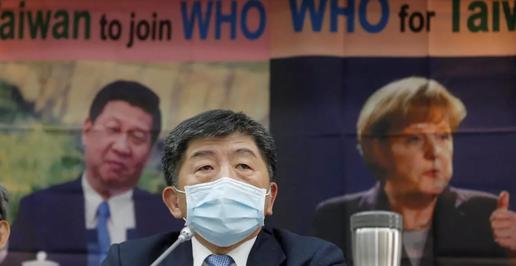Jianli Yang, a mathematician and human rights activist, survived China's Tiananmen Massacre in 1989, after which he left China for the United States. He returned in 2002 and was jailed between 2002 and 2007 for supporting the country's labor movement. He was intermittently held in solitary confinement for a total of 15 months – as detailed in a previous IranWire interview – and returned to the US after his release.
In a weekly series for IranWire, Jianli Yang analyses Chinese disinformation around the origin of coronavirus and its handling to date.
The buzz in the corridors of power in the United States, Europe and large tracts of Asia is over a question the whole post-coronavirus world will need to address: how to counter China's bullying and its threats to restrict trade and investment.
For the first time in decades, China is – or at least, initially was – on the back foot. Certain world leaders saw in the use of phrases such as “the Chinese virus'' and "Chinese bat virus" a justification to bring the Dragon back to its knees on the global stage and isolate it in world trade as a result of the outbreak of coronavirus. In contrast, not even Tiananmen Square could make the country’s leadership show any remorse.
In retaliation, the Chinese leadership has embarked on a global publicity campaign to blunt the criticism – which has only underscored how rattled it is by charges of a cover-up of the source of the virus and its spread.
The global lockdown and the temporary lull in global trade have also given some breathing space for countries to review their trade ties with the Dragon. Did they really need Chinese markets and imports that much? How to reduce dependence and strengthen internal production systems, and bolster intra-regional trade, say, within Europe? What about a trading bloc of south-east and far-east Asian countries?
Anti-China rhetoric in world media thus gave way to nationalistic calls for self-reliance in manufacturing. The European press exhorted European Union members to reduce their dependence on Chinese imports. Media in Indonesia, Taiwan, Vietnam, Korea and Japan are re-assessing their countries’ respective relations with China.
The common factor is China's bullying tactics, to which no country is an exception. Chinese self-interest propels China's diplomacy globally. For instance, China claims total ownership of the South China Sea, a vital waterway, and has been bullying other countries such as the Philippines, Vietnam, Indonesia and Malaysia over this point for decades. Even during the pandemic, China has regularly upped the ante in this region. Similar scuffles have broken out with Japan and South Korea over the East China Sea.
Now, post-coronavirus, these states are all finding their feet in the muddy waters of confrontation. The challenges appear to be binding them together, at least in spirit. There are calls to turn this nascent bond into a formal trading entity. Some of these countries are already their own territories as future manufacturing hubs to attract global investment.
Decades of Belligerence and Blackmail
China shares more than 20,000 kilometers of land borders with 13 states, and has ongoing border disputes with nearly all of them. Central Asian countries like Kyrgyzstan and Tajikistan have claimed they have been forced to either accept China’s territorial claims or pay a penalty, in the form of steep interest rates on loans. Failure to repay the loans will, furthermore, result in the forfeiture of projects financed by Chinese loans and the disputed land of the loaned country.
A couple of weeks ago, China reportedly pressured the European Union into revising a report by the European External Action Service tracking misinformation about Coronavirus. The report had originally concluded: “China has continued to run a global disinformation campaign to deflect blame for the outbreak of the pandemic and improve its international image.” Chinese foreign ministry officials called on the EU embassy in Beijing, warning it to be ready for consequences if this statement was not revoked. Eventually, the EU dropped the negative reference to China.
Why are EU members putting up with this? Elsewhere, Chinese diplomats have demanded – but failed to secure – a public declaration from Germany praising Chinese efforts to contain the virus, and threatened a penalty for Czech companies if a senior politician went ahead with a visit to Taiwan. Earlier this year, China also threatened the market positions of German car makers if the country kept the Chinese state-owned company, Huawei, away from its 5G telecom networks.
European analysts now surmise that although China continues to be a formidable trading giant, even in the face of an economic slowdown, growing debts and coronavirus-related losses, Europe must realize that in real terms it is not deeply dependent on China for its trading requirements. Intra-EU trade per day is of the tune of 30 billion euros, compared to roughly 1.5 million euros between the EU and China. Of course, China’s perceived indispensability lies not in turnover but in its control of global supply chains. It is for this reason that the EU chorus for reducing dependence on foreign production bases is gaining ground, emphasizing the idea of convincing China to be part of a growing new world of positive multilateralism.
Experts Blocked From Attending WHO Assembly
The last few months have seen China conduct military drills near Taiwan, with Chinese J-11 fighter jets, H-6 bombers and early warning aircraft flying close to its air defense zone. China has even piled pressure on the World Health Organization (WHO) and European states to keep Taiwan out of its most recent assembly on coronavirus. Eventually, the island nation relented and did not attend, despite European health experts saying its expertise was needed.
At the WHO summit in mid-May, China then nominally gave its consent to a general review of the origin and spread of coronavirus, without naming itself. Why, in this context, would this powerful state have opposed the presence of Taiwan?
The Chinese communist regime cannot afford any further international recognition of Taiwan, not so much because of its external image but because it must keep stoking nationalist feeling at home. Since Tiananmen, the regime has relied on two sources to legitimize and cement its rule: fast economic growth and nationalism. With the former now in question, it is forced to depend more and more on the latter more.
No matter what post-Covid international order we have, it will be unjust and unacceptable if Taiwan continues to be excluded. The key question is: for how long will the world allow China to bully and blackmail its way through?
Also in this series:
Missing Data, Mud-Slinging and “Miracle Cures”: Why Disinformation Is Bad For Your Health
Iranian Online Network Still Peddling Coronavirus Disinformation
Putin’s Domestic Problems Eclipse Russian Disinformation Campaigns
China's Campaign to Protect President Xi against Coronavirus Criticism
Chinese Embassies Work Overtime to Diffuse International Fury Over Coronavirus
Russia Bans Coronavirus "Fake News" and Slams US Over Press Freedom
China Blocks Investigations Amid Refusal to Shut Down Wet Markets
From Coronavirus to the Second World War: On the Frontlines of the Russian Disinformation Battle
Russia Blames West for Propaganda While Reporting Unlikely Number of Covid-19 Deaths
As Criticism of China Falters, Time for a NATO for Human Rights?
Guest Post From Russia: How do You Put the Brakes on a Fake News Machine?
Has China Really Given Assent to a Global Coronavirus Review?
visit the accountability section
In this section of Iran Wire, you can contact the officials and launch your campaign for various problems

























comments